Creating Clear Mountain Theravada Monastery
To Serve Sangha in the Greater Seattle Area
Written by: Venerable Nisabho
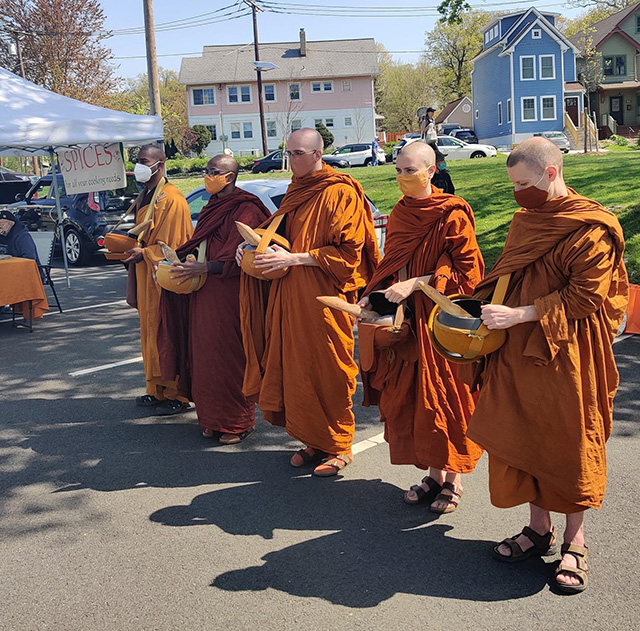
Tan Nisabho, Ayya Soma, Bhante Suddhaso, Samanera Sumano, and Samanera Diamond on alms round at Empty Cloud Monastery in Newark, N.J.
Photos by: Abhayagiri Monastery, Empty Cloud Monastery, Pacific Hermitage, Ayya Soma
This summer some leaders in the Seattle Buddhist community are taking first steps to create a Thai forest monastery not far from downtown Seattle.
While monasteries springing from the Ajahn Chah lineage exist near Portland, and in British Columbia and northern California, Clear Mountain Monastery will be the first near Seattle, though it will remain independent of the official lineage.
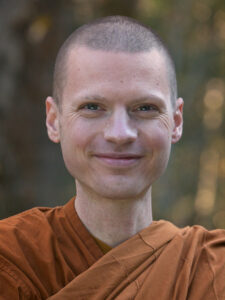
Tan Nisabho, a U.S,-born Buddhist monk ordained in the Thai forest tradition in 2013. He currently lives in Seattle as part of the Clear Mountain Monastery project.
As monastic founder of Clear Mountain Monastery I have started by taking up residence in a small hut just outside Seattle,. You can find its location on Clear Mountain’s website. Each morning I walk for alms to the nearby town or ferry and stand quietly, allowing those so inspired to offer food, as monastics of my tradition do not accept or handle money. If people later wish to come to the hut to offer food or to converse, they may.
This complete surrender to the generosity of others keeps monastics from cutting themselves off in a spiritual cocoon, and allows others to cultivate their spiritual aspirations through generosity. While one does not always receive food, a few days of hunger is a small price to pay for the beauty of such a relationship.
Eventually, if enough people show interest, the newly-formed Clear Mountain Monastery Foundation will purchase a relatively quiet piece of land about 45 minutes from Seattle, accessible by public transport.

Monastics lead lay people in a walking meditation “mindfulness hike” at Empty Cloud Monastery in 2020.
Although Clear Mountain Monastery will primarily serve as a home for monastics of the Thai forest tradition, it will also provide refuge for other local Buddhists by offering teachings, pūjās (morning and evening sessions of chanting and meditation), retreats, and visits from various teachers. The monastery also will develop relationships with sangha through the surrounding community’s daily meal offerings.
In the traditional spirit of dhamma, all teachings, classes, books, and retreats will be offered completely free of charge, with nothing expected in return. Monasteries exist dependent on the mutual generosity and interdependence of monastics and laity as a spiritual community.
The Theravada Thai forest tradition is considered one of the most disciplined monastic traditions in Buddhism, representing a return to the simple way of life practiced by the Buddha and his early disciples. As monastics we own just three robes and some basic requisites such as needle and thread. We are required to eat before noon and are prohibited from handling money or storing food, so we must walk for alms every day for our once-daily meal.
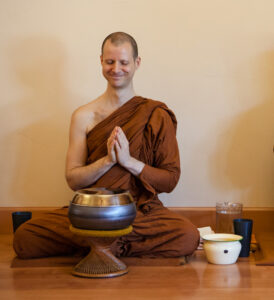
Ajahn Kovilo, a U.S.-born monk ordained at Abhayagiri in 2010, plans to live and practice at Clear Mountain Monastery.
Such a life inclines one toward meditation, deep study, and a relationship of mutual support and sharing dhamma with the surrounding community.
I’m launching Clear Mountain Monastery after eight years training at monasteries around the world, studying under monastic teachers including Ajahn Anan and Ajahn Pasanno. During my travels and practice I had continued to feel the call of the Pacific Northwest, and finally decided to return home from Thailand. The America I’d left after finishing university now seemed fractured, and I felt the dhamma that had so healed me might also help mend others’ rift of spirit.
Pacific Hermitage outside Portland is an example of the type of community I hope to create. Pacific Hermitage consists of a central building and several monastic huts, or kutis, scattered through the forest.
Each morning at 5 a.m. Pacific Hermitage monks gather for 30 minutes of chanting and an hour of sitting, though some arrive to meditate much earlier. After this the monks head out on alms round, walking to the neighboring town of White Salmon, Wash., where supporters wait to offer food.
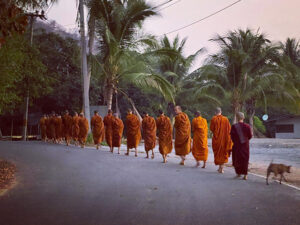
Monks in Thailand must walk for alms each day, which keeps them engaged with the surrounding community.
After several years monks on alms round has become a common and valued feature of the community, and a daily reminder of life’s spiritual goal. Over time the alms round at Pacific Hermitage has grown to include houses, restaurants, and a Montessori school whose students have the chance to offer food and to speak with the monks about kindness, generosity, and the size of snakes in Thailand.
The two-hour alms round ends back at the hermitage, where residents participate in a work period, cleaning, tending the grounds, and ensuring that the hermitage remains a welcoming refuge for those who need it. At 11 a.m. the monastics gather to chant a blessing, a reflection of gratitude, and eat their one meal of the day silently from their alms bowls.
If there are no pressing tasks for the afternoon the monks return to their kutis to practice meditation and to study the dhamma. They then gather in the evening for a final communal session of chanting, and a final sit.
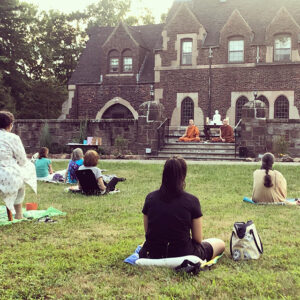
Ayya Soma and Bhante Suddhaso leading the local Buddhist community in a group meditation at Empty Cloud Monastery.
While Pacific Hermitage houses only two or three monastics and lacks overnight facilities for visiting laity, monasteries can be much larger. Abhayagiri Monastery in California supports nearly 20 monastics, featuring a central cloister organized around a large meditation hall and numerous kutis for visiting laity, hidden in an expanse of forest.
While as a new project Clear Mountain will necessarily begin as a hermitage, with the right conditions it may well evolve into a full-fledged monastery.
Clear Mountain will develop as a partner project with Cascade Hermitage in Winthrop, Central Washington. Founded by my parents, both long-time practitioners, Cascade Hermitage will host monastics from all traditions for long-term retreat, many of whom will give teachings. In addition to these offerings, the hermitage will host a free two-day meditation retreat the final weekend of each month, led by myself and by other monks and nuns.
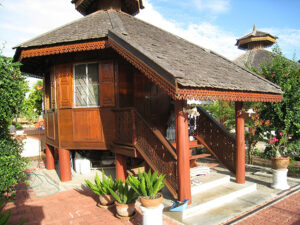
The monastery will include huts for each monk, though likely less ornate than this one in Thailand.
The monastic form has crossed borders before. Whether walking below the towering jackfruit trees of Thailand’s jungle or the moist conifers of the Puget Sound region, a monastic’s basic intention should remain unchanged: to live simply, to give back what they can, and to dedicate their life to the purification of the heart. What fruits spring from this simple seed, planted in the Northwest’s soil, will be a joy to see.
To learn more about the Clear Mountain Monastery project or get involved, visit our website at www.clearmountainmonastery.org or email info@clearmountainmonaster.org. To learn more about the Cascade Hermitage and its monthly retreats, visit cascadehermitage@gmail.com. Welcome!
Venerable Nisabho left his native Washington in 2012 to go forth as a Buddhist monk in Thailand under Ajahn Anan, a senior disciple of renowned meditation master Ajahn Chah. He spent the following years training in forest monasteries throughout Thailand, Australia, and the United States, before returning to Seattle in July of 2021 to help found a monastery on the quiet outskirts of the city. To learn more about Clear Mountain Monastery, visit www.clearmountainmonastery.org.
